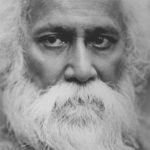I pick up the skirt,
I pick up the sparkling beads
in black,
this thing that moved once
around flesh,
and I call God a liar,
I say anything that moved
like that
or knew
my name
could never die
in the common verity of dying,
and I pick
up her lovely
dress,
all her loveliness gone,
and I speak to all the gods,
Jewish gods, Christ-gods,
chips of blinking things,
idols, pills, bread,
fathoms, risks,
knowledgeable surrender,
rats in the gravy of two gone quite mad
without a chance,
hummingbird knowledge, hummingbird chance,
I lean upon this,
I lean on all of this
and I know
her dress upon my arm
but
they will not
give her back to me.
I actually don’t like Bukowski’s poems. Can I say that? He was a prolific poet famous for having been a bit nuts, an alcoholic and womaniser, and sometimes when I read his poems it makes me feel like I’m stuck at a bar talking to a very foul-mouthed drunkard who won’t shut up. His poems are very ‘in-your-face’; you can almost smell the liquor on his breath as you read them. To me, reading those poems is unpleasant. I often find the language unpleasant (I’m sorry, I know I must sound like a prude); I’d just rather not read that sort of language in poetry.
There are things I do like about Bukowski: his fearless originality of structure, the apparently unabashed honesty of his poems, as well as the lack of sentimentality. His are almost ‘anti-poems’ because they just refuse to be reverent. There is no music, no rhyme, and he takes you places don’t expect (and probably don’t want) to go to in a poem.
However, I do like this particular poem exactly because it is so different from the sort of poetry I have been describing above. It seems almost out of character. Bukowski wrote it following his wife’s death, and the pain expressed in it is heartbreaking. His desolation is tangible in that little-boy opening, “I pick up the skirt”, and the shock and disbelief as he writes “this thing that moved once/ around flesh” feels so very poignant to me. This is grief, but it is up-close and raw; it is not romanticised or transformed into melancholic beauty which is not real. He is in shock and cannot quite comprehend that the being he loved most in the world no longer moves and breathes in flesh and clothing.
I love the tone of anger as the poet writes “and I call God a liar”, it is my favourite line. He “lean[s] upon” God, upon “blinking things/ idols, pills, bread/ fathoms, risks”; he leans upon the nostalgia of the dress, searches for crutches to help him to survive in his state of loss and loneliness, but knows in his heart that “they will not/ give her back to me”. I love the ending because of its simplicity. Why dress up grief? Why change anything? Grief is mostly wordless, and if it is to be expressed it had surely better be expressed in this way — in realistic, plain monosyllables.
Reviewed by Emily Ardagh



